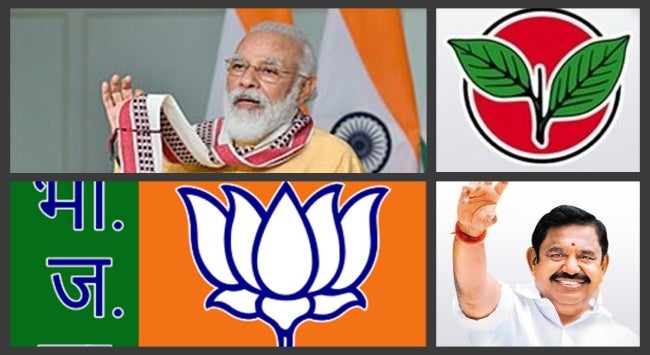Summary
A year ahead of the Tamil Nadu Assembly elections, the Bharatiya Janata Party (BJP) has announced a pre-poll alliance with the All India Anna Dravida Munnetra Kazhagam (AIADMK). However, the BJP-AIADMK alliance will have to do plenty of work to pose a serious challenge to the incumbent Dravida Munnetra Kazhagam government.
While it is often said that there is always an election happening in India, 2025 has seen a lull with only two state elections – the one in Delhi that is already over and the other in Bihar at the end of the year. However, 2026 will be a busy year with two major states going to the polls: Tamil Nadu and West Bengal. Since both states have never had a Bharatiya Janata Party (BJP) government, the stakes in the electoral battle are high.
The BJP has announced a pre-poll alliance in Tamil Nadu with a regional party – the All India Anna Dravida Munnetra Kazhagam (AIADMK) – in an effort to unseat the incumbent Dravida Munnetra Kazhagam (DMK) government. This is a change in direction for the BJP, which had chosen not to ally with the AIADMK in Tamil Nadu in the 2024 general election. In 2024, the BJP had tied up with a few smaller regional parties, including the breakaway V K Sasikala faction of the AIADMK – the Amma Makkal Munnetra Kazhagam. While it did not win a single seat, the BJP’s vote share jumped by around eight per cent to 11 per cent. The AIADMK, which contested in an alliance with smaller regional parties, including the Desiya Murpokku Dravida Kazhagam (DMDK), did not win a single seat either but garnered 21 per cent of the vote share. The DMK, in contrast, won 22 of the 39 seats in Tamil Nadu with a vote share of 27 per cent, and its main ally, the Congress, won nine seats with a vote share of 11 per cent.
Simple arithmetic suggests that a BJP-AIADMK alliance could prove to be a formidable one. The last time the two parties contested together was in the 2021 Assembly elections, the first since AIADMK supremo J Jayalalithaa’s death in 2016, where the BJP won four seats and the AIADMK 66 of the 234 seats in the Tamil Nadu Assembly. The BJP’s vote share in 2021 was three per cent and the AIADMK’s 33 per cent. The DMK, on the other hand, won 46 per cent of the vote share and 133 seats.
If the BJP and AIADMK’s vote shares in 2024 are added, they come to around 32 per cent compared to 38 per cent for the DMK and the Congress. This leaves out the share of the smaller parties that had allied either with the DMK, the AIADMK or the BJP. There were 11 Assembly segments in the 2024 elections where the combined AIADMK-BJP vote share exceeded 50 per cent, 60 segments where it was between 40 and 50 per cent and 39 segments between 30 and 40 per cent.
Had the BJP, the AIADMK and their allies contested together and if their vote shares were combined, they would have hypothetically won 13 seats. In terms of Assembly segments, the DMK alliance led in 221 Assembly segments, the AIADMK alliance in 10 and the BJP alliance in three. If the AIADMK, the BJP and their smaller alliance partners had contested together, they would have led in 84 Assembly segments. Since the BJP would have won a chunk of the anti-DMK votes, this probably led to a splitting of the opposition vote in the general elections. Some of this could transfer to the AIADMK, though a perfect transfer of votes between parties rarely occurs.
Ground realities also present a more complicated situation. First, the BJP usually experiences a bump during the general elections due to the increasingly presidential nature of the elections and the popularity of Prime Minister Narendra Modi. This factor is usually muted during the Assembly polls.
Second, the AIADMK has not yet recovered from the demise of Jayalalithaa and does not have a charismatic leader who enjoys statewide popularity. It has also been weakened by the breakaway factions led by Sasikala and O Panneerselvam.
Third, the alliance between the BJP and the AIADMK, which is likely to have benefits in the short run, could end up stunting the BJP’s growth in the state. The charismatic chief of the BJP Tamil Nadu unit, K Annamalai, who had been against an alliance with the AIADMK and under whose watch the party showed dramatic gains in the 2024 elections, has resigned and has been replaced by Nainar Nagenthran. The BJP-AIADMK alliance will be led by AIADMK general secretary Edappadi K Palaniswami.
Fourth, the ruling DMK and Chief Minister M K Stalin have been playing up the North-South divide in Indian politics, especially with regard to the delimitation issue and the Centre’s three-language formula, which they view as an imposition of Hindi. The BJP, which is still seen as a North Indian party, would find it difficult to combat the DMK’s Dravidian politics despite its tie-up with the AIADMK.
There is almost a year to go before the Tamil Nadu elections. That the BJP has tied up with the AIADMK well in advance signals its intent to prepare for the elections in earnest. However, the BJP-AIADMK alliance will have to do plenty of work to pose a serious challenge to the incumbent DMK.
. . . . .
Dr Ronojoy Sen is a Senior Research Fellow and Research Lead (Politics, Society and Governance) at the Institute of South Asian Studies (ISAS), an autonomous research institute at the National University of Singapore (NUS). He can be contacted at isasrs@nus.edu.sg. The author bears full responsibility for the facts cited and opinions expressed in this paper.
Pic Credit: Wikimedia Commons and AIADMK Facebook.
-
 More From :
More From :
-
 Tags :
Tags :
-
 Download PDF
Download PDF



